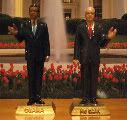After changing its mind about throttling Bittorrent traffic last month, Comcast has pulled a 180° on network neutrality. Last week, Comcast announced plans to publish a consumers’ “bill of rights and responsibilities,” detailing what subscribers should expect from their ISP and laying out network management best practices.
Naturally, the “Save the Internet” crowd isn’t satisfied with Comcast’s declaration. Being protocol-agnostic wasn’t enough for them, and neither is a consumer bill of rights. Customers will only be safe from evil ISPs, they say, with aggressive neutrality mandates like Rep. Markey’s proposed legislation.
On one hand, Comcast’s declaration is good news for Bittorrent users, and illustrates the responsiveness of market forces. And as a Comcast subscriber, I’m all for non-discriminatory networks. (Though I seed torrents quite rarely, it’s nice to know the option exists.)
But declaring a consumer “Bill of Rights” is a risky approach. Comcast is ceding key ground to interventionists by implicitly admitting that consumers have some inherent right to unfiltered, unmanaged networks. They don’t—despite what lawmakers like Byron Dorgan have suggested.
Essentially, Comcast is saying “If we have to be neutral, then so should all the other guys. Otherwise, they’re violating consumer rights.”
Yet some ISPs are making just the opposite argument, identifying the benefits of curbing bandwidth-intensive applications. In comments filed last week, Bell Canada contended that throttling is in the public interest, explaining that 95% of subscribers suffer on account of file sharing. GigaOM posted a story yesterday that lends further credence to claims that peer-to-peer traffic is a major culprit of network congestion.
Perhaps we shall see a competing bill of rights—one holding that customers have the right to affordable broadband access free from file sharing-induced slowdowns.
As bandwidth demand continues to grow, ISPs must make tough choices. Between price increases, bandwidth caps, and protocol discrimination, it is far from clear what’s best for the average user. If AT&T’s prediction is correct that in three years time, 20 typical households will consume as much bandwidth as the entire Internet does today, then carriers will need to invest billions upgrading both the backbone and last-mile. Discouraging investment through regulation poses a far greater threat to the Internet’s future than hypothetical neutrality violations.
If neutrality truly is as virtuous as its proponents suggest (and I suspect it is) then it will ultimately triumph on its own merits, without the need for government intervention. Still, exclusionary, proprietary networks may yet play an invaluable role in propelling connectivity, despite closed systems’ shortcomings. Who knows what will work out best in the long run? Market experimentation is the only way to find out.


 The Technology Liberation Front is the tech policy blog dedicated to keeping politicians' hands off the 'net and everything else related to technology.
The Technology Liberation Front is the tech policy blog dedicated to keeping politicians' hands off the 'net and everything else related to technology.